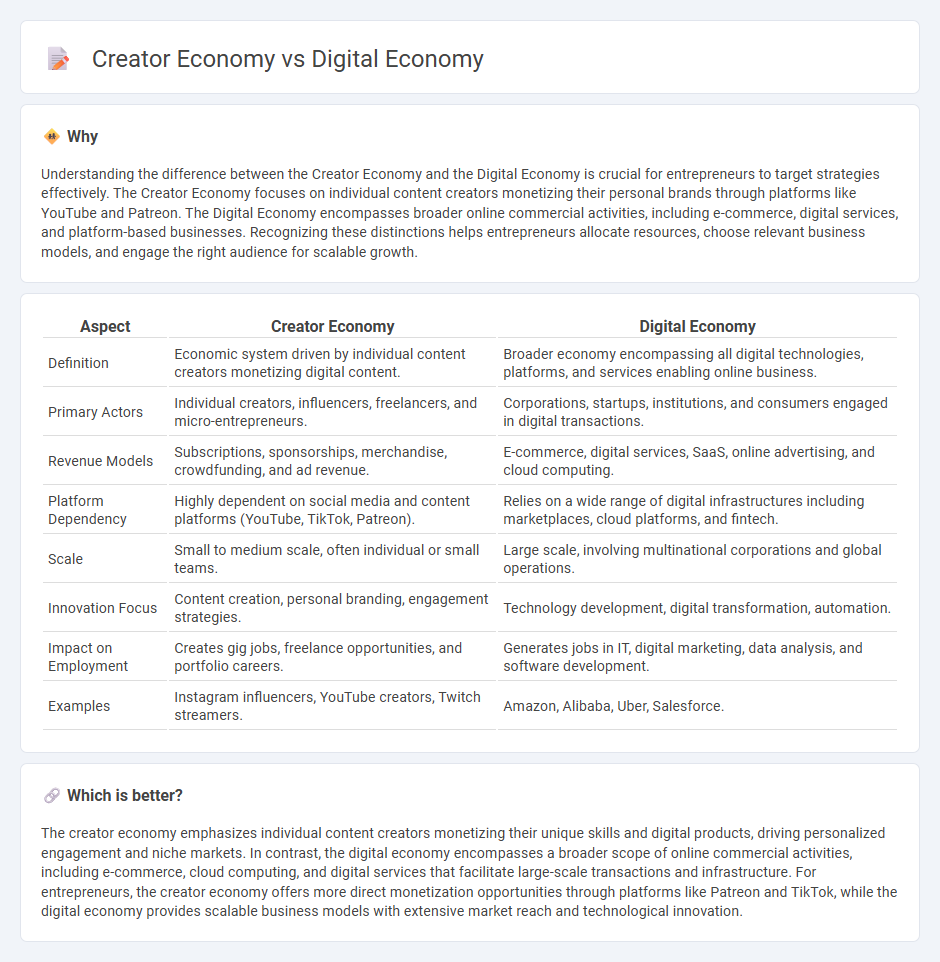
The creator economy thrives on individual content producers monetizing their skills and audiences through platforms like YouTube, TikTok, and Patreon, emphasizing personal branding and niche communities. In contrast, the digital economy encompasses a broader spectrum of online activities including e-commerce, digital services, and cloud computing, driven by large-scale platforms such as Amazon, Alibaba, and Google. Explore the evolving dynamics between these economies to understand the future of entrepreneurship.
Why it is important
Understanding the difference between the Creator Economy and the Digital Economy is crucial for entrepreneurs to target strategies effectively. The Creator Economy focuses on individual content creators monetizing their personal brands through platforms like YouTube and Patreon. The Digital Economy encompasses broader online commercial activities, including e-commerce, digital services, and platform-based businesses. Recognizing these distinctions helps entrepreneurs allocate resources, choose relevant business models, and engage the right audience for scalable growth.
Comparison Table
| Aspect | Creator Economy | Digital Economy |
|---|---|---|
| Definition | Economic system driven by individual content creators monetizing digital content. | Broader economy encompassing all digital technologies, platforms, and services enabling online business. |
| Primary Actors | Individual creators, influencers, freelancers, and micro-entrepreneurs. | Corporations, startups, institutions, and consumers engaged in digital transactions. |
| Revenue Models | Subscriptions, sponsorships, merchandise, crowdfunding, and ad revenue. | E-commerce, digital services, SaaS, online advertising, and cloud computing. |
| Platform Dependency | Highly dependent on social media and content platforms (YouTube, TikTok, Patreon). | Relies on a wide range of digital infrastructures including marketplaces, cloud platforms, and fintech. |
| Scale | Small to medium scale, often individual or small teams. | Large scale, involving multinational corporations and global operations. |
| Innovation Focus | Content creation, personal branding, engagement strategies. | Technology development, digital transformation, automation. |
| Impact on Employment | Creates gig jobs, freelance opportunities, and portfolio careers. | Generates jobs in IT, digital marketing, data analysis, and software development. |
| Examples | Instagram influencers, YouTube creators, Twitch streamers. | Amazon, Alibaba, Uber, Salesforce. |
Which is better?
The creator economy emphasizes individual content creators monetizing their unique skills and digital products, driving personalized engagement and niche markets. In contrast, the digital economy encompasses a broader scope of online commercial activities, including e-commerce, cloud computing, and digital services that facilitate large-scale transactions and infrastructure. For entrepreneurs, the creator economy offers more direct monetization opportunities through platforms like Patreon and TikTok, while the digital economy provides scalable business models with extensive market reach and technological innovation.
Connection
The creator economy thrives within the digital economy by leveraging online platforms that enable content creators to monetize their skills and audiences directly. Digital economy infrastructures, such as social media, e-commerce, and cloud services, provide essential tools for entrepreneurs to scale personal brands and generate revenue streams. Together, these interconnected economies drive innovation, digital entrepreneurship, and new market opportunities globally.
Key Terms
Platformization
Platformization transforms the digital economy by enabling centralized ecosystems that connect users, services, and data through scalable digital platforms such as Amazon, Google, and Alibaba. The creator economy, driven by platforms like YouTube, TikTok, and Patreon, empowers individual content creators to monetize their work directly, bypassing traditional intermediaries. Explore how platformization redefines economic interactions and unlocks new opportunities in both digital and creator economies.
Monetization
Digital economy monetizes through platforms like e-commerce, ad-based services, and subscription models, generating revenue from user interactions and data exchange. Creator economy centers on individual content creators leveraging social media, crowdfunding, and brand partnerships to directly earn income from their audiences. Explore how both economies transform value creation and income streams in the modern market.
Intellectual Property
The digital economy emphasizes technological infrastructure and data-driven services, while the creator economy centers on individual content creators generating original intellectual property (IP) such as digital art, music, and written content. Intellectual property rights in the creator economy protect creators' innovations and ensure revenue streams through licensing, royalties, and brand collaborations. Discover how IP management reshapes opportunities for creators in the evolving economic landscape.
Source and External Links
Digital economy - Wikipedia - The digital economy describes how traditional economic activities are transformed by internet technologies and involves digital computing enhancing productivity, work, organizations, and economic interactions globally.
What is the Digital Economy? | Definition from TechTarget - The digital economy encompasses economic activities enabled by connecting people, businesses, devices, and data digitally, heavily influenced by AI, connectivity, and emerging tech such as the metaverse, reshaping industries and business models.
Digital economy | EBSCO Research Starters - The digital economy is the expansive network of economic transactions enabled by internet and digital technologies, driven by advances in computing and mobile tech, with benefits and challenges including market concentration and privacy concerns.
 dowidth.com
dowidth.com